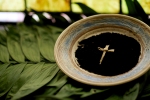April 5, 2011
Morning Prayer Solitaire
As part of our Lenten series on spirituality and social justice, Will, a new parishioner, taught one class on the use of daily Morning Prayer. He came to us from the Roman Catholic Church and has absolutely fallen maddeningly in love with the Book of Common Prayer. He has now finished the full two-year cycle of Daily Office readings and the constant repetition of all the psalms that a devotion to Morning Prayer provides to a faithful person.
However, he has never, ever experienced Morning Prayer as a corporate form of worship. As an old Episcopalian formed in the Diocese of Southern Ohio that blows my mind.
In my first church Morning Prayer was the standard worship service. It caused a stir when we moved to having Eucharist twice a month. The cadences and canticles of the Morning Prayer liturgy were etched on the hearts and minds of many generations of Episcopalians.
But with the adoption of the 1979 Book of Common Prayer the balance changed. On page 13 in the section titled Concerning the Service of the Church it read, “The Holy Eucharist, the principal act of Christian worship on the Lord’s Day and other major Feasts, and Daily Morning and Evening Prayer, as set forth in this Book, are the regular services appointed for public worship in this Church.” The Eucharist trumped Morning Prayer as “the principle act of Christian worship.”
Since that time two things have happened. The Eucharist supplanted Morning Prayer for Sunday worship and fewer and fewer churches maintained the practice of reading the Daily Office corporately during the week. Bye-bye Morning Prayer in public worship.
Which is why my devout Catholic church member Will, recently discovering the Book of Common Prayer, had to piece together the ritual dance of Bible, psalter and prayer book that is Morning Prayer using tabs, book marks, and inserts. All on his own.
How can we rediscover the richness of corporate worship that Morning Prayer offers? One way might be to use that liturgy as the first half of the Eucharist on Sunday mornings. Another way could be to bite the bullet and have at least the clergy reading Morning Prayer at church once a week for whoever might choose to come. Even more creative ways are possible.
Jon Fergueson, rector of Redeemer, Kenmore, in our diocese was bemoaning the loss of community and the difficulty in maintaining the Daily Office at his church. So he developed a Morning Prayer Podcast and now a good size group of his members engage in virtual corporate worship during weekday mornings.
Whatever it takes, the Episcopal Church needs to find ways to preserve this important part of our liturgical tradition. I know Will will. Where there’s a Will there’s a way.





